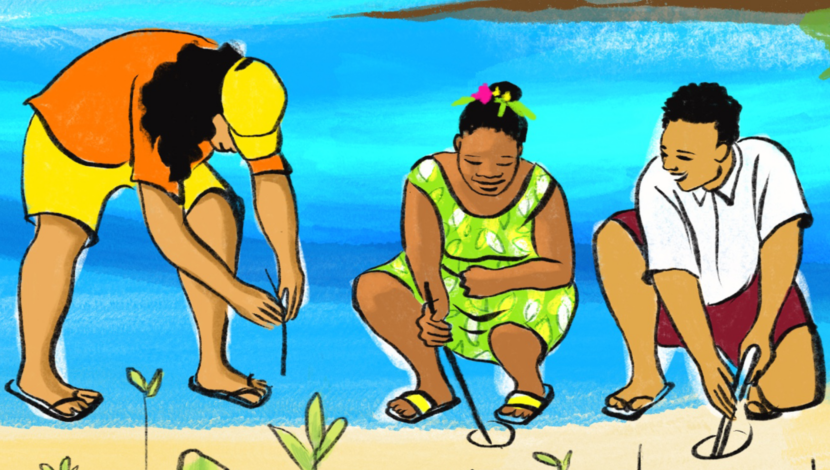The Unitarian Universalist Service Committee advances human rights through grassroots collaborations.
UUSC Amplifies Banaban Voices at the UN

By Rae Bainteiti on January 24, 2025
Between the 1950s and 1970s, Banaban advocates made tireless efforts to bring their plight to the attention of the United Nations. They sought to raise awareness about the devastating impacts of phosphate mining, which had been destroying their ancestral land since 1900. The environmental destruction was not the only concern—this ongoing harm also led to their forced relocation in 1945 from Banaba (now part of Kiribati) to Rabi Island, Fiji. This displacement resulted in complex social, economic, political, cultural, and spiritual challenges for the Banaban people. Despite their persistent calls for help, their efforts to engage the UN were largely ignored.
However, thanks to the financial support of UUSC and the ongoing work of the Banaban Human Rights Defenders Network (BHRDN) and the International Center for Advocates Against Discrimination (ICAAD) that started in 2020, the Banaban community has reached a historic milestone. In 2024, they utilized Fiji’s Universal Periodic Review (UPR) as a platform to bring international attention to the systemic discrimination and ongoing human rights abuses they face. In their joint submission, Banaban leaders highlighted a broader pattern of harassment and violence against human rights defenders in Fiji. These concerns were echoed by Ireland, which recommended that Fiji conduct “impartial, thorough, and independent investigations into attacks, harassment, and intimidation against civil society members, human rights defenders, and journalists.”
For decades, the Banaban people have fought for equity, reparations, and recognition of the profound harm caused by their forced displacement, trauma, and the environmental devastation of their ancestral homeland. The legacy of phosphate mining on Banaba stands as a powerful reminder of the community’s resilience and determination—a community that has long been denied the justice it deserves. At the UN, for the first time, the Banaban story was not only told—it was heard.
In the summary of stakeholder reports key Banaban issues were highlighted, including the following:
- Fiji’s failure to fulfill several fundamental rights guaranteed in its constitution, such as the rights to education, housing, water and sanitation, adequate food, and health.
- A report from the Senior Medical Officer at the Rabi Health Centre, which declared the island’s water unsafe for drinking. It also revealed that the health centre, which is the only one on Rabi Island, is severely under-resourced and unable to meet the health needs of the Banaban population. For non-basic healthcare and maternity care, Banabans must travel between 80 and 200 kilometers to other islands—an often prohibitively expensive journey.
Rae Bainteiti, a volunteer and Banaban human rights defender, reflected on the significance of this moment: “We didn’t just present facts; we shared who we are. For a historically marginalized community, this was about reclaiming our narrative on the world stage. We look forward to following national processes to ensure that the issues we highlighted are addressed by Fiji at the national level. The work ahead for Banaban human rights defenders is crucial, and we are grateful to UUSC for supporting us in this effort, underscoring the importance of its work with indigenous communities like ours. We look forward to more support for following up on these important processes.”
The Banaban people’s advocacy at the UN is a testament to their perseverance and a step closer to justice. With continued support, their voices will be amplified, and their struggle for recognition, reparations, and respect for their rights will continue to gain global momentum.
Image credit: UUSC & Micah Bazant
